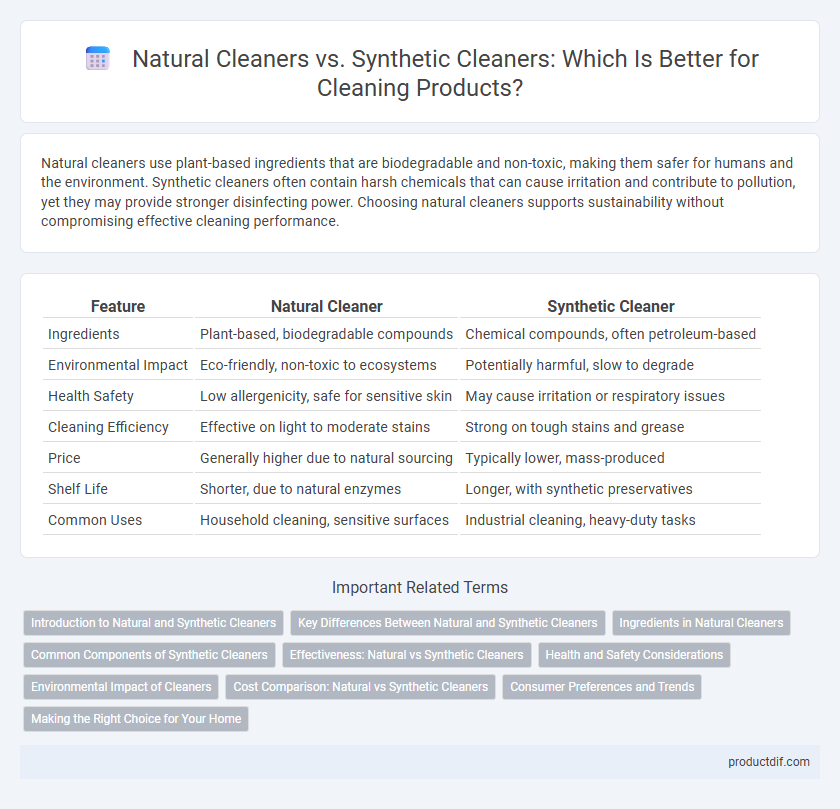Natural cleaners use plant-based ingredients that are biodegradable and non-toxic, making them safer for humans and the environment. Synthetic cleaners often contain harsh chemicals that can cause irritation and contribute to pollution, yet they may provide stronger disinfecting power. Choosing natural cleaners supports sustainability without compromising effective cleaning performance.
Table of Comparison
| Feature | Natural Cleaner | Synthetic Cleaner |
|---|---|---|
| Ingredients | Plant-based, biodegradable compounds | Chemical compounds, often petroleum-based |
| Environmental Impact | Eco-friendly, non-toxic to ecosystems | Potentially harmful, slow to degrade |
| Health Safety | Low allergenicity, safe for sensitive skin | May cause irritation or respiratory issues |
| Cleaning Efficiency | Effective on light to moderate stains | Strong on tough stains and grease |
| Price | Generally higher due to natural sourcing | Typically lower, mass-produced |
| Shelf Life | Shorter, due to natural enzymes | Longer, with synthetic preservatives |
| Common Uses | Household cleaning, sensitive surfaces | Industrial cleaning, heavy-duty tasks |
Introduction to Natural and Synthetic Cleaners
Natural cleaners harness plant-based ingredients such as vinegar, citrus extracts, and essential oils to effectively remove dirt and grime without harmful chemicals. Synthetic cleaners rely on chemically formulated compounds designed for targeted cleaning power and quick results, often containing surfactants, solvents, and preservatives. Choosing between natural and synthetic cleaners depends on factors like environmental impact, safety, and specific cleaning needs.
Key Differences Between Natural and Synthetic Cleaners
Natural cleaners contain plant-based ingredients and are biodegradable, reducing environmental impact and potential health risks. Synthetic cleaners often include petrochemicals and artificial fragrances that provide stronger grease-cutting power but may emit volatile organic compounds (VOCs). The effectiveness of natural cleaners tends to be gentler and safer for sensitive surfaces, whereas synthetic cleaners offer more aggressive stain removal and disinfecting capabilities.
Ingredients in Natural Cleaners
Natural cleaners primarily contain biodegradable ingredients such as plant-based surfactants, essential oils, and natural enzymes, which effectively break down dirt and grime without harmful chemicals. These products often exclude synthetic fragrances, dyes, and harsh solvents, reducing environmental impact and potential health risks. The use of renewable resources in natural cleaners supports sustainable production and safer indoor air quality.
Common Components of Synthetic Cleaners
Synthetic cleaners commonly contain surfactants, solvents, and preservatives that enhance grease-cutting power and shelf life. Surfactants lower surface tension, allowing dirt and oils to be lifted from surfaces effectively, while solvents dissolve stubborn stains and residues. Preservatives prevent microbial growth, ensuring the product remains stable and safe for prolonged use.
Effectiveness: Natural vs Synthetic Cleaners
Natural cleaners often utilize enzymes and plant-based acids that effectively break down organic stains and dirt without harsh chemicals, making them safer for sensitive surfaces and the environment. Synthetic cleaners typically contain powerful surfactants and chemical agents that provide rapid disinfection and stain removal, excelling in heavy-duty tasks and high-traffic areas. Effectiveness depends on specific cleaning needs, as natural cleaners offer gentle yet efficient cleaning for everyday use, while synthetic options deliver fast, potent results in industrial or stubborn cleaning scenarios.
Health and Safety Considerations
Natural cleaners contain plant-based ingredients that reduce exposure to harmful chemicals and minimize allergic reactions, promoting safer indoor air quality. Synthetic cleaners often include harsh chemicals like ammonia and bleach, which can cause respiratory irritation, skin burns, and long-term health risks with prolonged use. Opting for natural cleaners supports environmental sustainability and lowers the risk of toxic buildup in homes, enhancing overall health and safety.
Environmental Impact of Cleaners
Natural cleaners typically contain biodegradable ingredients that reduce pollution and minimize harm to aquatic ecosystems, making them a more eco-friendly option. Synthetic cleaners often include petrochemicals and non-biodegradable substances that contribute to water contamination and disrupt soil health. Choosing natural cleaners supports sustainable environmental practices by lowering toxic chemical runoff and promoting healthy ecosystems.
Cost Comparison: Natural vs Synthetic Cleaners
Natural cleaners generally have higher upfront costs due to organic ingredients and sustainable sourcing, but they often reduce long-term expenses by minimizing health-related and environmental impact costs. Synthetic cleaners are typically cheaper to purchase initially because of mass production and inexpensive chemical components but may lead to higher indirect costs from potential toxicity and environmental damage. Evaluating total cost-effectiveness requires considering both immediate price and long-term health and ecological expenses for natural versus synthetic cleaning products.
Consumer Preferences and Trends
Consumers increasingly favor natural cleaners due to growing awareness of environmental impact and health benefits, driving demand for plant-based, biodegradable ingredients. Synthetic cleaners, while often more potent and cost-effective, face scrutiny over chemical additives and potential toxicity, influencing a shift toward safer alternatives. Market trends highlight a surge in eco-friendly product launches and transparent labeling to meet consumer expectations for sustainability and safety.
Making the Right Choice for Your Home
Choosing natural cleaners over synthetic options reduces exposure to harsh chemicals, promoting a safer indoor environment and protecting family health. Natural cleaners often use biodegradable ingredients like citrus extracts and essential oils, which effectively remove dirt without lingering toxic residues. Synthetic cleaners may provide strong immediate results but can contribute to indoor air pollution and skin irritation, making natural alternatives a smarter choice for sustainable home care.
Natural Cleaner vs Synthetic Cleaner Infographic

 productdif.com
productdif.com